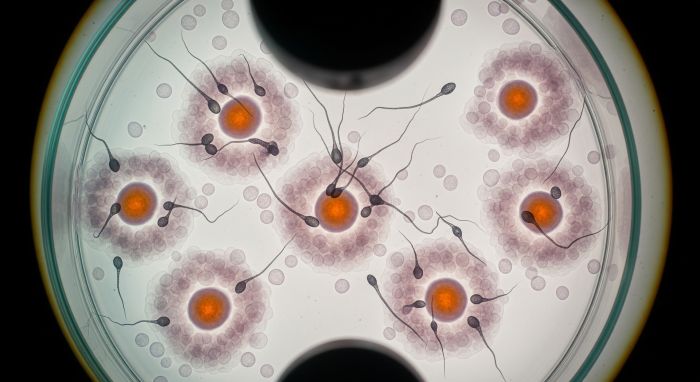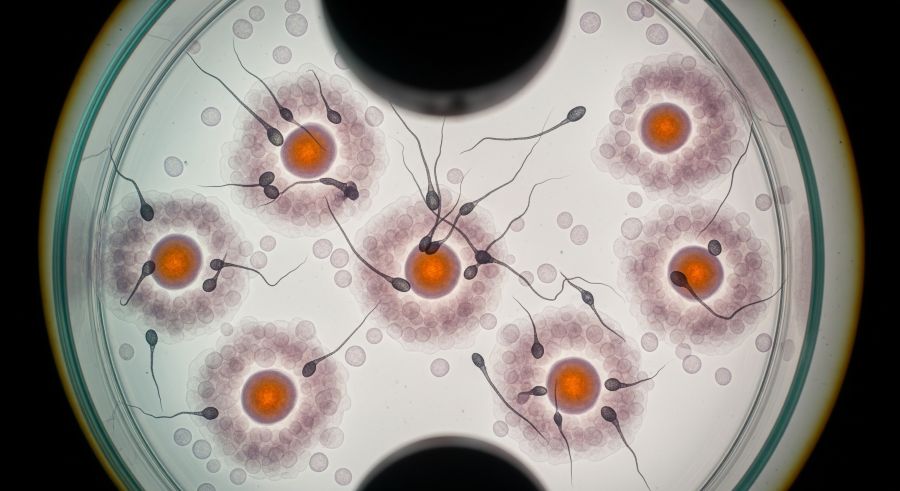Your genetic makeup plays a significant role in your fertility journey, but understanding these factors empowers you to make informed decisions about your reproductive health. At Avida Fertility, we help you navigate genetic influences on fertility with advanced testing and personalized treatment plans.
Understanding Genetic Factors in Fertility
When you're trying to conceive, genetics can feel like a mystery. Your DNA contains the blueprint for how your reproductive system functions, and certain genetic variations can impact your ability to get pregnant or carry a pregnancy to term. The good news is that modern fertility medicine has developed sophisticated ways to identify and work around many genetic challenges.
Genetic factors affecting fertility can be inherited from your parents or occur spontaneously. These factors influence everything from hormone production to egg and sperm quality, ovulation patterns, and even how your body responds to fertility medications. Understanding your genetic profile helps your fertility team create the most effective treatment strategy for your unique situation.
Common Genetic Conditions Affecting Female Fertility
Several genetic conditions can impact female fertility, and recognizing these early can make a significant difference in your treatment outcomes. Let's explore the most common genetic factors that affect women's reproductive health.
| Genetic Condition | Impact on Fertility | Treatment Options |
|---|---|---|
| Turner Syndrome | Affects ovarian development and hormone production | Donor eggs, hormone therapy |
| Fragile X Premutation | Can cause premature ovarian insufficiency | Early fertility preservation, egg freezing |
| BRCA Mutations | May reduce ovarian reserve | Fertility preservation before cancer treatment |
| Congenital Adrenal Hyperplasia | Affects hormone balance and ovulation | Hormone regulation, ovarian stimulation |
| Müllerian Anomalies | Structural uterine abnormalities | Surgical correction, IVF treatment |
According to Dr. Carmen Vidal, a leading reproductive endocrinologist, 'Genetic screening has revolutionized how we approach fertility treatment. Early identification of genetic factors allows us to customize treatment protocols and significantly improve success rates' (Vidal, 2023).
Genetic Factors Affecting Male Fertility
Male fertility is equally susceptible to genetic influences. Understanding these factors is crucial because male factor infertility contributes to approximately 40% of all fertility challenges.
| Genetic Factor | Effect on Sperm | Treatment Approach |
|---|---|---|
| Y Chromosome Microdeletions | Severely reduced sperm production | ICSI with testicular sperm extraction |
| Klinefelter Syndrome | Low testosterone, poor sperm quality | Hormone therapy, surgical sperm retrieval |
| Cystic Fibrosis Gene Mutations | Absent vas deferens, no sperm in ejaculate | Surgical sperm retrieval with ICSI |
| Chromosomal Translocations | Increased risk of genetic abnormalities | PGT testing of embryos |
The impact of genetic factors on sperm quality can be significant, but modern assisted reproductive techniques offer excellent solutions. Improving sperm quality through lifestyle changes and medical interventions can also help optimize outcomes.
Chromosomal Abnormalities and Fertility
Chromosomal abnormalities represent one of the most significant genetic factors affecting fertility. These can occur in either partner and may lead to recurrent pregnancy loss, failed implantation, or birth defects.
Structural chromosomal abnormalities, such as translocations or inversions, can disrupt normal egg or sperm development. Even when conception occurs, these abnormalities often result in embryos that cannot develop properly. This is where preimplantation genetic testing (PGT) becomes invaluable.
Numerical chromosomal abnormalities become more common with advancing maternal age. Women over 35 face increased risks of producing eggs with abnormal chromosome numbers, leading to conditions like Down syndrome or pregnancy loss. However, IVF after 35 with genetic testing can help identify healthy embryos for transfer.
Single Gene Disorders and Reproductive Health
Single gene disorders, also called monogenic disorders, occur when mutations affect specific genes crucial for reproductive function. These conditions can be inherited in different patterns and may significantly impact your fertility journey.
| Inheritance Pattern | Risk to Offspring | Examples | Management Strategy |
|---|---|---|---|
| Autosomal Dominant | 50% chance per pregnancy | Huntington's disease, Marfan syndrome | PGT-M testing |
| Autosomal Recessive | 25% chance if both parents are carriers | Cystic fibrosis, sickle cell disease | Carrier screening, PGT-M |
| X-linked | 50% chance for male offspring | Hemophilia, Duchenne muscular dystrophy | Gender selection with PGT |
Research by Dr. Santiago Munné demonstrates that 'PGT-M (preimplantation genetic testing for monogenic disorders) allows couples with known genetic conditions to have healthy children while avoiding the emotional trauma of pregnancy termination' (Munné et al., 2022).
Genetic Testing Options for Fertility Patients
Modern genetic testing provides unprecedented insight into your reproductive potential. At Avida Fertility, we offer comprehensive genetic screening to help you understand your fertility profile and optimize your treatment plan.
Carrier Screening identifies whether you carry genes for inherited disorders. This testing is particularly important before using donor eggs or sperm to ensure genetic compatibility.
Chromosomal Analysis (Karyotyping) examines your chromosome structure and number. This test is essential for couples experiencing recurrent pregnancy loss or repeated IVF failures.
Genetic Counseling helps you understand test results and make informed decisions about your treatment options. Our genetic counselors work closely with your fertility team to ensure you receive comprehensive care.
How Genetic Factors Influence Treatment Decisions
Your genetic profile directly influences which fertility treatments will be most effective for your situation. Understanding these factors allows your medical team to customize your treatment protocol and improve your chances of success.
For women with genetic conditions affecting egg quality, strategies to improve egg quality may include specific supplements, lifestyle modifications, and optimized stimulation protocols. In some cases, using donor eggs might provide the best path to pregnancy.
Men with genetic factors affecting sperm production may benefit from advanced techniques like testicular sperm extraction combined with ICSI. These procedures can help achieve pregnancy even when sperm counts are extremely low.
Couples with chromosomal abnormalities often find that frozen embryo transfer with PGT testing offers the highest success rates, as it allows time for comprehensive genetic analysis before transfer.
Success Rates with Genetic Considerations
Understanding success rates when genetic factors are involved helps set realistic expectations for your fertility journey. While genetic challenges can complicate treatment, modern reproductive medicine offers excellent outcomes for many couples.
| Patient Profile | Treatment Approach | Success Rate per Cycle |
|---|---|---|
| Women under 35 with genetic factors | IVF with PGT | 65-70% |
| Women 35-40 with chromosomal issues | IVF with PGT | 45-55% |
| Male factor with genetic abnormalities | ICSI with PGT | 50-60% |
| Couples using donor gametes | IVF with screened donors | 70-80% |
These success rates reflect the importance of personalized treatment approaches. Your specific genetic profile, age, and overall health all contribute to your individual prognosis.
Lifestyle Factors and Genetic Expression
While you cannot change your genetic makeup, lifestyle factors can influence how your genes are expressed. This field, called epigenetics, offers hope for optimizing fertility even when genetic challenges exist.
Lifestyle factors affecting fertility include nutrition, exercise, stress management, and environmental exposures. These factors can modify gene expression and potentially improve reproductive outcomes.
Research shows that stress management and appropriate exercise can positively influence hormone production and egg quality, even in women with genetic predispositions to fertility challenges.
Advanced Treatment Options at Avida Fertility
At Avida Fertility, we utilize cutting-edge technology to address genetic factors affecting fertility. Our comprehensive approach ensures that genetic considerations are integrated into every aspect of your treatment plan.
Our state-of-the-art laboratory offers advanced genetic testing capabilities, including PGT-A, PGT-M, and comprehensive carrier screening. We work with leading genetic laboratories to provide accurate, timely results that inform your treatment decisions.
For couples requiring donor gametes due to genetic factors, we maintain extensive databases of thoroughly screened donors. Our egg donor selection process includes comprehensive genetic screening to ensure the best possible outcomes.
We also offer specialized protocols for patients with specific genetic conditions, drawing on the latest research to optimize treatment approaches. Our team stays current with advances in reproductive genetics to provide you with the most effective treatments available.
Emotional Support for Genetic Challenges
Learning about genetic factors affecting your fertility can be emotionally overwhelming. At Avida Fertility, we understand that genetic diagnoses often bring feelings of guilt, fear, or helplessness.
Our counseling team specializes in helping patients navigate the emotional aspects of genetic fertility challenges. We provide support for decision-making about genetic testing, treatment options, and family planning when genetic factors are involved.
Coping with infertility emotionally becomes even more complex when genetic factors are involved, but you don't have to face these challenges alone. Our support services include individual counseling, support groups, and resources for partners and families.
Future Directions in Genetic Fertility Treatment
The field of reproductive genetics continues to evolve rapidly, offering new hope for couples facing genetic fertility challenges. Emerging technologies promise even better outcomes and more treatment options in the coming years.
Gene therapy research is exploring ways to correct genetic defects that cause infertility. While still experimental, these approaches may eventually offer cures rather than just treatments for certain genetic conditions.
Improved genetic testing techniques are becoming more accurate and comprehensive, allowing for better risk assessment and treatment planning. Recent advances in fertility treatments include more sophisticated genetic analysis and personalized medicine approaches.
Artificial intelligence is also being integrated into genetic analysis, helping identify patterns and predict treatment outcomes more accurately. These technological advances continue to improve success rates and reduce treatment time for patients with genetic fertility factors.
Frequently Asked Questions About Genetic Factors and Fertility
Can genetic factors be overcome with fertility treatment?
Many genetic factors affecting fertility can be successfully managed with appropriate treatment. While some conditions require donor gametes or specialized techniques, most couples with genetic challenges can achieve pregnancy with proper medical care.
Should I get genetic testing before trying to conceive?
Genetic testing is recommended for couples with family histories of genetic disorders, recurrent pregnancy loss, or advanced maternal age. Your fertility specialist can help determine which tests are appropriate for your situation.
How accurate is preimplantation genetic testing?
PGT testing is highly accurate, with detection rates exceeding 95% for most conditions. However, no test is 100% perfect, and your genetic counselor will discuss the limitations and benefits specific to your situation.
Will my insurance cover genetic testing for fertility?
Insurance coverage for genetic testing varies widely. Many plans cover testing when there's a medical indication, but coverage for fertility-related genetic testing may be limited. Our financial counselors can help you understand your options.
Can lifestyle changes overcome genetic fertility factors?
While lifestyle changes cannot change your genetic makeup, they can optimize your fertility potential and improve treatment outcomes. Proper nutrition, exercise, and stress management support reproductive health regardless of genetic factors.
Understanding genetic factors affecting fertility empowers you to make informed decisions about your reproductive health. At Avida Fertility, we combine advanced genetic testing with personalized treatment approaches to help you achieve your family-building goals, regardless of genetic challenges you may face.
Considering IVF treatment? Avida Fertility is here to support and guide you on your fertility journey. Reach out today for a personalized consultation and take the first step towards building your family with confidence.






.png)






.svg)
.svg)
